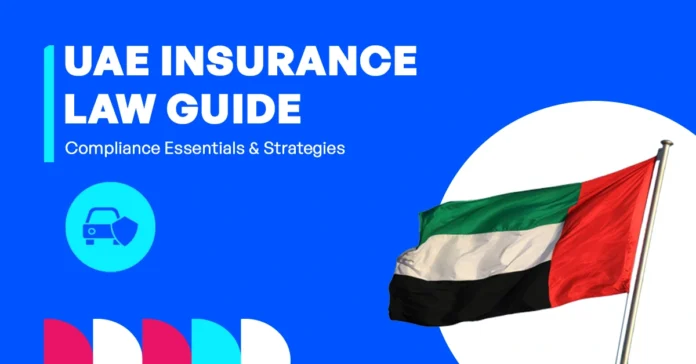The country’s insurance market is built on the UAE Insurance Law, a solid framework that ensures transparency, fairness, and consumer protection. Based on these laws, insurance companies are required to follow strict regulations which are designed to protect policyholder’s rights.
If issues arise, you can rely on insurance dispute resolution UAE channels or file a complaint to enforce your rights. If you don’t know how, stick around as in this article we’ll briefly explain how these laws work. Knowing this helps you to make smarter decisions with confidence and peace of mind, especially about your car insurance. These systems keep insurance compliance UAE in check and protect individuals from unfair practices.
Understanding UAE Insurance Law
The UAE insurance law basically refers to a set of regulations that determine how providers must operate, how consumers are protected, and how compliance is enforced. For both individuals and businesses, understanding this legal foundation is essential for navigating the industry with confidence.

Historical Context and Evolution
The UAE’s insurance framework has steadily evolved to align with international best practices while addressing local market needs. Initially governed by Federal Law No. 6 of 2007, oversight of the industry was later transferred to the Central Bank of the UAE (CBUAE). Most recently, Decree No. 48 of 2023 effective from November 30, 2023 further consolidated regulatory powers under the CBUAE, strengthening enforcement of insurance compliance UAE and enhancing mechanisms for insurance dispute resolution UAE.
Key Objectives of the Law
At its core, the UAE Insurance Law aims to protect consumers, promote transparency, and enhance trust between insurers and policyholders. It sets out to prevent unfair practices, guarantee insurance companies’ ability to handle their financial obligations, and provide clear pathways for insurance dispute resolution UAE.
Examples of these objectives in practice include:
- Requiring insurers to clearly disclose policy exclusions so customers are not misled. This is why every insurer provides its clients with a manual containing every detail of each policy, from the definition of key terms to exclusions.
- Enforcing solvency margins so that companies can always pay valid claims. This means that insurance companies are only allowed to sell a certain number of policies which is limited to their net worth and how much in claims they can theoretically pay.
- Mandating fair timelines for complaint handling (e.g., 15 days to investigate and respond).
- Preventing hidden fees or misleading advertising in insurance products.
- Providing structured appeals through the Insurance Dispute Resolution Committee for unresolved conflicts.
Compliance Essentials for Insurance Providers
For insurers and intermediaries, compliance is the foundation of sustainable business in the UAE. The UAE Insurance Law and supporting UAE insurance regulations set strict conditions to ensure that companies operate transparently, remain financially stable, and protect policyholders at every stage. Meeting these requirements is not only a legal necessity but also a critical part of building trust in a competitive market.
Licensing and Operational Requirements
Every insurance company in the UAE must get a license from the Central Bank to operate legally. They also need to show they have enough money, can pay claims, and follow fair business rules. These steps make sure insurance compliance UAE is met and that customers are dealing with safe, reliable providers
Types of licenses issued by the CBUAE include:
- Insurance Company License – for insurers offering life, health, property, general or car insurance.
- Reinsurance Company License – for firms providing coverage to other insurers.
- Insurance Broker License – for intermediaries who arrange policies between consumers and insurers.
Insurance Agent License – for entities representing one or more insurers in selling products. - Insurance Consultant License – for professionals offering independent advice on policies and coverage.
- Actuarial & Loss Adjuster Licenses – for specialists who assess risks, calculate premiums, and handle claims evaluations.
Product Approval and Disclosure
Before being offered to the public, all insurance products require approval from the CBUAE. Providers must also disclose every detail of their products, terms, conditions, benefits, and exclusions. So policyholders can make informed decisions. This level of transparency, required under UAE Insurance Law is meant to minimizes the risk of disputes and supports smoother resolution processes when claims arise.
Financial Reporting and Auditing in UAE Insurance Regulations
Regular submission of financial statements and independent audits are mandatory for insurers under UAE insurance regulations. These practices safeguard the financial health of insurance entities, assure regulators of solvency, and protect consumers from potential risks. Failure to comply can result in penalties or even revocation of licenses, reinforcing the importance of robust oversight and accountability across the industry.
Consumer Rights and Protection
Insurance companies in the UAE must regularly share their financial reports and go through independent checks. This proves they are stable, can pay claims, and follow the rules. If they don’t, they can face fines or even lose their license, which helps keep insurance compliance UAE strong and protects customers.
Policyholder Rights
Consumers are entitled to clear information about their policies, timely claim settlements, and protection against unfair practices. Under Insurance Law, insurers must investigate complaints within 15 days of receipt and provide written reasons for any claim denials. If problems with an insurer aren’t solved, people can use insurance dispute resolution UAE channels or file a complaint with the insurance authority to protect their rights.
Key rights for policyholders include:
- The right to clear and transparent information about premiums, benefits, exclusions, and terms.
- The right to timely claim settlements without unnecessary delays.
- The right to complaint handling within 15 days, including written justifications for any denial.
- The right to protection against unfair practices, such as hidden fees or misleading advertising.
- The right to escalate unresolved issues through insurance dispute resolution UAE or the insurance authority complaint system.
Mandatory Insurance Coverage
In the UAE, some types of insurance are compulsory under UAE insurance regulations, ensuring that individuals are protected and the community as a whole benefits from wider financial security. These requirements also reinforce insurance compliance UAE by making sure everyone has access to essential coverage.
Examples of mandatory insurance include:
- Motor Insurance – Third-party liability coverage is required for all vehicles to ensure compensation in case of accidents.
- Health Insurance – Mandatory for residents in emirates such as Dubai and Abu Dhabi, covering basic healthcare needs.
- Workers’ Compensation Insurance – Employers must provide coverage for workplace injuries and occupational hazards.
- Professional Liability Insurance (for specific sectors) – Required in certain regulated professions, such as financial services and healthcare, to protect clients and businesses.
Dispute Resolution and Filing Complaints
The UAE Insurance Law gives people clear ways to handle problems with their insurance company. If a disagreement happens, there are official channels to make sure the issue is reviewed fairly, resolved quickly, and with accountability. These steps build trust in the system and reassure consumers that their concerns will always be heard.

Internal Complaint Handling
Insurance companies in the UAE must keep a record of all complaints and respond within set deadlines. They have to review issues fairly and give answers on time. If the customer is still not satisfied, the case can be taken to the insurance authority or other regulators. This process makes sure insurance compliance UAE is followed and that consumers are treated fairly.
Sanadak Platform
To enhance transparency, the Central Bank of the UAE created the Sanadak platform, an independent unit for handling consumer complaints against licensed financial institutions and insurance companies. Policyholders can submit their grievances online, through the mobile application, or in person. This platform adds another layer of protection under Insurance Law, making it easier for consumers to seek quick and fair resolutions.
Appeals Process
If a consumer is dissatisfied with the initial outcome of their complaint, they can appeal to higher authorities such as the Appeals Committee for Licensed Financial Institutions or the Insurance Dispute Resolution Committee. These avenues reinforce the principles of UAE insurance regulations and guarantee that consumers have multiple opportunities to protect their rights when facing unresolved disputes.
Strategies for Ensuring Compliance in UAE insurance laws
Compliance is not just a legal requirement; it is also a strategic necessity for insurers who want to maintain credibility in the UAE’s competitive market. The UAE Insurance Law, originally issued under Federal Law No. 6 of 2007 and now regulated by the Central Bank of the UAE (CBUAE) sets the foundation for how providers must operate. By following practical strategies, insurers can stay aligned with UAE insurance regulations, reduce risks, and strengthen consumer trust.
Regular Training and Awareness
Insurance rules in the UAE change over time to match market needs and global standards. That’s why companies train their staff regularly, so employees know the rules, act fairly, and stay updated. This helps avoid mistakes and ensures insurance compliance UAE is always met.
Robust Internal Controls
To follow the rules, insurance companies need strong internal checks. Regular audits help them spot problems early, avoid financial risks, and stay stable under UAE insurance regulations. These controls also make the business more transparent and reduce the chances of customers filing insurance authority complaints.
Engagement with Regulatory Authorities
Insurance companies must stay in regular contact with the Central Bank of the UAE (CBUAE) and other regulators. Talking directly with authorities helps them understand new rules, prepare for changes, and adjust their practices. This cooperation also supports insurance dispute resolution UAE by building a culture of fairness and accountability.
Conclusion
The UAE insurance law sets clear rules that protect consumers, guide insurers, and keep the market stable. It covers everything from licensing and product approval to policyholder rights and dispute resolution. For customers, this means confidence when buying policies and fair options to resolve complaints.
For insurers, following strict standards builds trust and credibility. By knowing the basics of UAE insurance law and its requirements, both individuals and companies can make smarter choices. In the end, a strong legal system benefits everyone with fairness, protection, and peace of mind.
Frequently Answered Questions
1. What is the role of the Central Bank of the UAE in insurance regulation?
The Central Bank of the UAE (CBUAE) is the primary regulator of the insurance sector. It enforces the UAE Insurance Law and oversees all UAE insurance regulations, including licensing, product approval, solvency monitoring, and consumer protection.
2. How can I file a complaint against my insurance company in the UAE?
If you have an issue with your insurer, you can first raise it directly with the company. Insurers are required to keep a complaint register and address grievances within set timelines. If unresolved, you can escalate the matter by submitting an insurance authority complaint through the Central Bank of the UAE or via the Sanadak platform.
3. What types of insurance are mandatory in the UAE?
Certain forms of coverage are compulsory under UAE insurance regulations. These include third-party liability insurance for motor vehicles across the Emirates, and health insurance in emirates like Dubai and Abu Dhabi.
4. How long does an insurance company have to respond to a complaint?
Under the Insurance Law, insurance companies must investigate consumer complaints within 15 days of receipt. If a claim is denied, they must provide written reasons to the policyholder, ensuring transparency and fairness in line with UAE insurance regulations.
5. What should I do if I’m not satisfied with the outcome of my complaint?
If you are unhappy with the resolution provided by your insurer, you can escalate your case through insurance dispute resolution UAE channels. This may involve submitting your case to the Sanadak platform or appealing to committees such as the Insurance Dispute Resolution Committee or the Appeals Committee for Licensed Financial Institutions.


